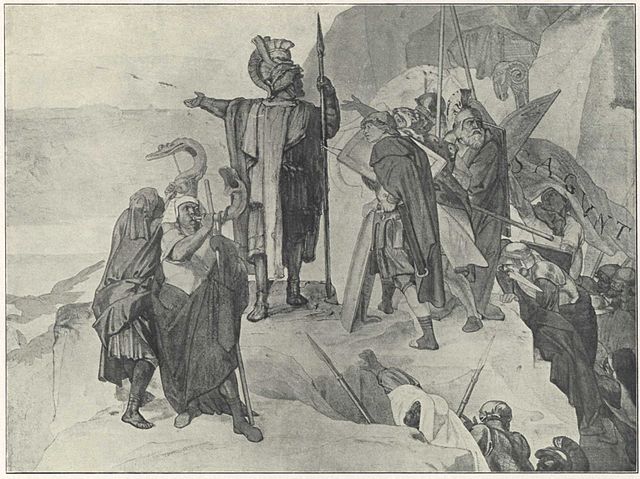The Limits of Brilliance: The Role of Supply Problems in Hannibal’s Failed Italian Campaign
By Jack Morato
Saber and Scroll, Vol. 3:4 (2014)
Introduction: The year 241 BCE saw Rome emerge victorious from the First Punic War. The verdict of that war gave Rome control of Sicily, wrested from the mighty Carthaginian empire by hard fighting at sea. However, Rome’s appetite for conquest was far from sated. Taking full advantage of the weakened condition of their foe in 237, the Romans seized the islands of Sardinia and Corsica as well. This post-war opportunism intensified Carthaginian resentment and virtually guaranteed a second war. Hannibal Barca, that incomparable commander who nearly brought Rome to its knees, was Carthaginian hatred personified. He tested the political will of the Roman ruling elite and the legendary perseverance of the Roman people. His campaign in Italy, known to history as the Hannibalic War of 218-201, set in motion the social, economic, and political currents which eventually resulted in the demise of the Roman Republic. The conflict was a life and death struggle for control of the Western Mediterranean, a struggle the Roman historian Livy described as “the most memorable of any that have ever been waged.” Rome’s legions and the commanders who led them proved to be outclassed on the battlefields of Italy.
To survive the onslaught – indeed, the wholesale massacre – the Romans learned through bitter experience to employ a strategy of attrition, containment, and isolation. They also learned to capitalize on their substantial advantage in manpower and logistics. Mighty as Hannibal was in the field, he did not have the staying power or the resources needed to bring about a favorable settlement with Rome. Hannibal’s undoing was the result of the deliberate Roman policy of harassment and deprivation, his inability to win a critical mass of political support from the Italian communities, and his failure to find a long-term solution to his considerable supply needs.
The most important literary source for this particular period of Roman history is the account of the Greek historian Polybius. Polybius (204-122) was a statesman and soldier who spent many years in Rome as a captive of the Republic. He was sent to Rome as part of a larger group of one thousand leading citizens of the Achaean League on suspicion of collaboration with the Macedonian ruler Perseus in the aftermath of the Third Macedonian War. He lived and worked during a dangerous time, an era of expanding Roman interference and bellicosity in the Hellenistic East. As a leading citizen of the Achaean League he needed to tread carefully in his attempt to preserve the independence of the Greeks while concurrently depriving the Romans of any pretense for further aggression against his homeland. He was ultimately unsuccessful, for in addition to their prowess in war, the Romans were exceptionally adept at finding any excuse to legitimize the subjugation of their enemies.

 Having come of age during this dynamic time, Polybius had access to eyewitnesses of the Hannibalic War. He had become acquainted with the consul Lucius Aemilius Paullus during the latter’s campaign against Perseus in the Third Macedonian War. During his sixteen-year captivity in Italy from 167-151 Polybius was allowed to stay at the residence of Aemilius Paullus and through him gained access to the leading citizens of Rome. Among them was Scipio Africanus the Younger, better known as the commander who orchestrated the final destruction of Carthage. Polybius witnessed the once-proud city of Carthage burn during the Third Punic War (149-146).
Having come of age during this dynamic time, Polybius had access to eyewitnesses of the Hannibalic War. He had become acquainted with the consul Lucius Aemilius Paullus during the latter’s campaign against Perseus in the Third Macedonian War. During his sixteen-year captivity in Italy from 167-151 Polybius was allowed to stay at the residence of Aemilius Paullus and through him gained access to the leading citizens of Rome. Among them was Scipio Africanus the Younger, better known as the commander who orchestrated the final destruction of Carthage. Polybius witnessed the once-proud city of Carthage burn during the Third Punic War (149-146).
In addition, he witnessed the sack of Corinth by the Consul Lucius Mummius in 146. There is a bit of the historian in every history. However, Polybius was fully aware of the importance of historical objectivity. He made explicit his desire to be an unbiased recorder of events, pointing out that students should not be, “led astray by the ignorance or partisanship of historians.” His willingness to bestow praise on friend and foe alike suggests Polybius was, in part, successful. As both a man of affairs and a man of war, Polybius understood the complex interconnectedness of politics, strategy, and tactics.
Click here to read this article from Saber and Scroll

Sponsored Content


The Limits of Brilliance: The Role of Supply Problems in Hannibal’s Failed Italian Campaign
By Jack Morato
Saber and Scroll, Vol. 3:4 (2014)
Introduction: The year 241 BCE saw Rome emerge victorious from the First Punic War. The verdict of that war gave Rome control of Sicily, wrested from the mighty Carthaginian empire by hard fighting at sea. However, Rome’s appetite for conquest was far from sated. Taking full advantage of the weakened condition of their foe in 237, the Romans seized the islands of Sardinia and Corsica as well. This post-war opportunism intensified Carthaginian resentment and virtually guaranteed a second war. Hannibal Barca, that incomparable commander who nearly brought Rome to its knees, was Carthaginian hatred personified. He tested the political will of the Roman ruling elite and the legendary perseverance of the Roman people. His campaign in Italy, known to history as the Hannibalic War of 218-201, set in motion the social, economic, and political currents which eventually resulted in the demise of the Roman Republic. The conflict was a life and death struggle for control of the Western Mediterranean, a struggle the Roman historian Livy described as “the most memorable of any that have ever been waged.” Rome’s legions and the commanders who led them proved to be outclassed on the battlefields of Italy.
To survive the onslaught – indeed, the wholesale massacre – the Romans learned through bitter experience to employ a strategy of attrition, containment, and isolation. They also learned to capitalize on their substantial advantage in manpower and logistics. Mighty as Hannibal was in the field, he did not have the staying power or the resources needed to bring about a favorable settlement with Rome. Hannibal’s undoing was the result of the deliberate Roman policy of harassment and deprivation, his inability to win a critical mass of political support from the Italian communities, and his failure to find a long-term solution to his considerable supply needs.
The most important literary source for this particular period of Roman history is the account of the Greek historian Polybius. Polybius (204-122) was a statesman and soldier who spent many years in Rome as a captive of the Republic. He was sent to Rome as part of a larger group of one thousand leading citizens of the Achaean League on suspicion of collaboration with the Macedonian ruler Perseus in the aftermath of the Third Macedonian War. He lived and worked during a dangerous time, an era of expanding Roman interference and bellicosity in the Hellenistic East. As a leading citizen of the Achaean League he needed to tread carefully in his attempt to preserve the independence of the Greeks while concurrently depriving the Romans of any pretense for further aggression against his homeland. He was ultimately unsuccessful, for in addition to their prowess in war, the Romans were exceptionally adept at finding any excuse to legitimize the subjugation of their enemies.
In addition, he witnessed the sack of Corinth by the Consul Lucius Mummius in 146. There is a bit of the historian in every history. However, Polybius was fully aware of the importance of historical objectivity. He made explicit his desire to be an unbiased recorder of events, pointing out that students should not be, “led astray by the ignorance or partisanship of historians.” His willingness to bestow praise on friend and foe alike suggests Polybius was, in part, successful. As both a man of affairs and a man of war, Polybius understood the complex interconnectedness of politics, strategy, and tactics.
Click here to read this article from Saber and Scroll
Sponsored Content